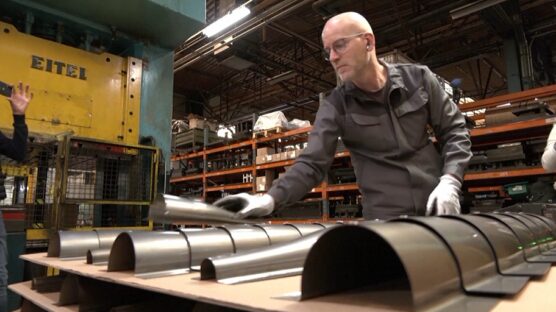Surprising facts about amphorae — antiquity’s packaging
By DW
18 August 2023 |
10:29 am
Five surprising facts about amphorae, the disposable packaging of antiquity, used for transporting oil, wine and olives. Their remains provide archeological information about food preferences and trade.
Related
4 hours ago
Related
1 day ago
Can you still send strong messages when you've rolled out the red carpet and chilled the champagne for a state dinner? China's Xi Jinping is being feted in the French capital for his first visit to Europe since 2019, despite trade tensions, spy scandals and insistence that he isolate Vladimir Putin over Russia's invasion of Ukraine.
1 day ago
Russian President Vladimir Putin is set to be inaugurated for a fifth term. In other news, there's new information on how Ludwig van Beethoven may have lost his hearing, some 197 years after his death. Finally, this year's Met Gala throws up a variety of sublime and ridiculous outfits.
8 hours ago
As rising temperatures cause glaciers around the world to recede, some countries are bolstering water supply by making their own.
4 hours ago
Jan Egeland, secretary general of the Norwegian Refugee Council and a former top UN humanitarian official, told FRANCE 24 on Tuesday that Gaza is "among the worst places in humanitarian history". He described a trapped population enduring "relentless" bombardment since October 2023. With regards to the southern city of Rafah, where an Israeli offensive appears imminent, he said some 1.4 million people were "engulfed in fear and desperation beyond belief".
4 hours ago
TikTok and its Chinese parent company ByteDance have filed a petition with a US court, seeking to block a law that forces them to sell the social media app to a non-Chinese buyer or face a ban. They argue the legislation is unconstitutional, setting the stage for a historic legal battle. But first, China's President Xi Jinping has arrived in Serbia on the second leg of his European tour. He expects to receive a much warmer welcome than he did in France.
39 mins ago
The Netherlands has always been known as a business-friendly country. But the country looks set to become a lot less hospitable following the result of November’s elections, in which the far right won the most votes. The four parties seeking to form a government have vowed to limit immigration, hitting both high-tech workers and students. Companies have started to voice their concern and some are even threatening to leave the country.
Latest
39 mins ago
South Africa's coastal city of Durban, known for its popular beaches and warm climate, is facing a severe water crisis ahead of national elections, with residents suffering from prolonged dry taps and poor sanitation services.
2 hours ago
Her powerful performances give voice to some uncomfortable truths. Lebanese playwright and director Chrystèle Khodr wades through the ruins of a society in her latest play "Ordalie", exploring the social, political and physical wreckage of her homeland and its history. She tells us more about the quest for justice in contemporary Lebanon, why 19th-century playwright Henrik Ibsen is a fitting contemporary inspiration and how making theatre in a crisis-ridden country is a constant endeavour of creativity and solidarity among artists.
2 hours ago
Paris 2024 official partner ArcelorMittal made 2,000 torches for the Paris 2024 Olympic and Paralympic Games.
6 hours ago
A security guard who was stationed outside Drake's Toronto mansion was shot, resulting in serious injuries. The incident occurred around 2 am local time, with the assailant reportedly fleeing the scene in a vehicle. Inspector Paul Krawczyk, who is leading the investigation, said it is too soon to determine a motive for the shooting.
8 hours ago
Could we soon get better drugs and faster computers thanks to research and production in space? Some companies are betting big on the idea of working in zero gravity. Here's how you can benefit.
9 hours ago
According to latest government estimates, the unemployment rate rose to 5.4% in the fiscal year that ended March 2023, from 4.9% in 2013/14 before Modi took over. In urban areas, the rate is higher at 6.5%.
Data from the Centre for Monitoring Indian Economy (CMIE), a private think tank, show that the jobless rate rose to 8% in February 2024.
×

Get the latest news delivered straight to your inbox every day of the week. Stay informed with the Guardian’s leading coverage of Nigerian and world news, business, technology and sports.


















0 Comments
We will review and take appropriate action.